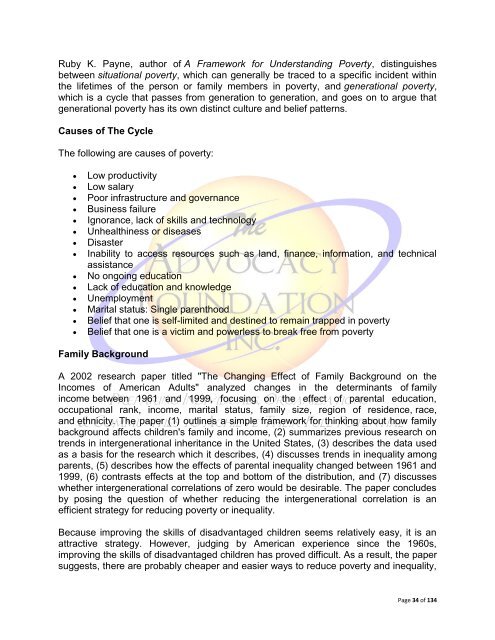Concentrated Poverty
Concentrated Poverty
Concentrated Poverty
You also want an ePaper? Increase the reach of your titles
YUMPU automatically turns print PDFs into web optimized ePapers that Google loves.
Ruby K. Payne, author of A Framework for Understanding <strong>Poverty</strong>, distinguishes<br />
between situational poverty, which can generally be traced to a specific incident within<br />
the lifetimes of the person or family members in poverty, and generational poverty,<br />
which is a cycle that passes from generation to generation, and goes on to argue that<br />
generational poverty has its own distinct culture and belief patterns.<br />
Causes of The Cycle<br />
The following are causes of poverty:<br />
<br />
<br />
<br />
<br />
<br />
<br />
<br />
<br />
<br />
<br />
<br />
<br />
<br />
<br />
Low productivity<br />
Low salary<br />
Poor infrastructure and governance<br />
Business failure<br />
Ignorance, lack of skills and technology<br />
Unhealthiness or diseases<br />
Disaster<br />
Inability to access resources such as land, finance, information, and technical<br />
assistance<br />
No ongoing education<br />
Lack of education and knowledge<br />
Unemployment<br />
Marital status: Single parenthood<br />
Belief that one is self-limited and destined to remain trapped in poverty<br />
Belief that one is a victim and powerless to break free from poverty<br />
Family Background<br />
A 2002 research paper titled "The Changing Effect of Family Background on the<br />
Incomes of American Adults" analyzed changes in the determinants of family<br />
income between 1961 and 1999, focusing on the effect of parental education,<br />
occupational rank, income, marital status, family size, region of residence, race,<br />
and ethnicity. The paper (1) outlines a simple framework for thinking about how family<br />
background affects children's family and income, (2) summarizes previous research on<br />
trends in intergenerational inheritance in the United States, (3) describes the data used<br />
as a basis for the research which it describes, (4) discusses trends in inequality among<br />
parents, (5) describes how the effects of parental inequality changed between 1961 and<br />
1999, (6) contrasts effects at the top and bottom of the distribution, and (7) discusses<br />
whether intergenerational correlations of zero would be desirable. The paper concludes<br />
by posing the question of whether reducing the intergenerational correlation is an<br />
efficient strategy for reducing poverty or inequality.<br />
Because improving the skills of disadvantaged children seems relatively easy, it is an<br />
attractive strategy. However, judging by American experience since the 1960s,<br />
improving the skills of disadvantaged children has proved difficult. As a result, the paper<br />
suggests, there are probably cheaper and easier ways to reduce poverty and inequality,<br />
Page 34 of 134

















